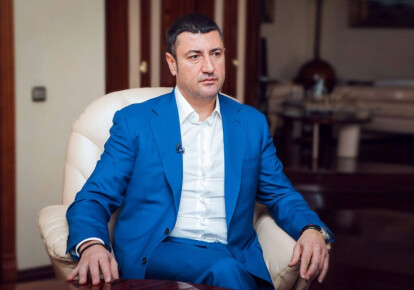Oleg Bakhmatyuk: Ukrlandfarming’s business model showcases Ukraine's potential
Founded in 2007, Ukrlandfarming has become the leading vertically integrated agro-industrial corporation in Ukraine, exporting to 40 markets. The company's clients include major global corporations such as Cargill and Glencore, with investments in agricultural assets totaling over $2.2 billion

Ukrlandfarming is a major player in the industry and has huge ambitions as the world looks for food suppliers to ensure global food security" said the founder and chairman of the board Oleg Bakhmatyuk when discussing Ukraine's untapped agricultural potential to "RBC.UA".
According to him, now is the right time to invest in this industry.
What is the company's business model and why has it been so successful?
We believe that one of our greatest achievements is our ability to create a large-scale conglomerate of technologically advanced agricultural operations.
We are convinced that our model can serve as a showcase of Ukraine's potential.
We’ve shown that it is possible to implement and manage a high-tech model of agriculture by adopting modern technology, as has been done through innovation and tight control, as well as precision farming. Forecasting, field management and other innovative technologies — we know how to use these tools in our operations.
How do you see the agricultural sector growing?
The sector is growing in Ukraine — almost 25 per cent annually according to our Ministry of Agrarian Policy. It is a thriving sector, moving towards a new paradigm whereby the market should be broken down into three main segments.
The first is small farmers whose task is to ensure food security in local markets. The second is medium-sized companies supplying home processing industry. The third, the top layer, is high-tech, large-scale, high-volume producers who can achieve the best performance in the industry and contribute to global food security.
This is how we see our role in this market.
You’ve said that Ukraine's agricultural potential still remains untapped. What is the potential for growth?
Let me give you some examples. Germany, like the USA, is one of the world's leading manufacturers of agricultural machinery, and we believe that Germany has a lot of opportunities to explore in Ukraine's agricultural sector.
The area of precision farming and increasing agricultural yields (plant protection and nutrition) using chemicals, is an unexplored market and there are numerous opportunities for German investors to explore.
Food security is also a very powerful tool and source of influence when we talk about regions such as the Middle East or North Africa that need assistance in ensuring food security. This is where Ukraine can play a role by providing a valuable proposition to the world's leading financiers and institutions.
There are exciting opportunities for those who are developing innovative approaches and can use Ukraine as a testing ground for new technologies, agricultural machinery and precision farming, which is a new industry.
So, you're saying now is the best time to do this?
Ukraine could actually become a battleground for very healthy competition between the US and Germany to be the early bird that drinks the dew. And by investing in Ukraine, they could gain sufficient control over the flow of goods to important markets in the Middle East and Asia. Ukraine could become a Brazil for Europe of 20 years back.
Over the next 10 years, Ukraine could easily double its output, such as grain exports. Or better yet, turn a lot of grain into high value-added products such as animal proteins.
Is Ukrlandfarming open to partnering with German investors and businesses to realise its global ambitions?
We are open to exploring opportunities, although we recognise that the business investment climate has deteriorated since 2014 and we have suffered painful losses in eastern Ukraine. But we have a project to build a seaport on the Black Sea coast. Ukrlandfarming is not just a grain producer, we are a vertically integrated conglomerate with many key assets such as elevators and logistics.
Our crown jewel will be the port we intend to build to transport grain for our customers.
A $200-800 million project, but it's on hold now, and we are actively looking for partners to join us and invest. We hope that after the elections a window of opportunity will open, and we will take our chance on investors in Europe, Asia, the US and the Middle East.
How important is the EU market for the company?
The EU is very protective of domestic markets when it comes to food imports. Ukraine over the last four years has had to look outside the Russian market for opportunities. We are exploring Asia, traditional markets such as the Middle East and Africa, and we are also looking at the EU, which is probably the most difficult market to enter. At the same time, Ukraine is now successfully implementing its plans.
What about the German market?
Germany sets quality criteria for food products and production equipment. The German market is one of the most important ones, and we are very pleased to have entered it. At the same time, we expect a lot of resistance from local industry associations.
The flip side of the coin is that the more German investors there are in Ukraine, the easier it will be for Ukraine to export agricultural products to Germany, as both sides will be bound by mutual interests.
Germany is one of the largest producers of agricultural goods and technology, probably producing twice as much as the US. Ukraine is therefore an attractive and lucrative market for German investment.
What can you do to lower barriers to entry?
The grain market is less complicated in Spain and Italy. We are interested in the egg market. The EU has given Ukraine a small quota for egg products, but even this has caused a wave of opposition from industry associations in Poland and other EU countries. We can produce high quality eggs and egg products at low prices, but as long as we face opposition there is little we can do.
We are grateful that the EU has opened its high-margin market to Ukrainian agricultural products. But we cannot fight on our own; Ukraine badly needs trade champions.
How is your company recovering after the events of 2014?
The group was hit hard in 2014, losing almost 50 per cent of its assets in the east of the country due to the armed conflict, and we were the dominant player in that region. "Ukrlandfarming has now substantially recovered the lost volume, but most importantly, we have reduced our dependence on market relationships and they are now split 45-55 per cent.
Our strategy is to sell 70 per cent to export markets and 30 per cent to domestic markets, thereby reducing sovereign risk. Today we export to some 40 countries and plan to enter Singapore and Indonesia. But many of these markets do not offer high margins, the numbers are much lower than in the EU. Over the next five to seven years, we hope that the EU market will open up for us, and we have to be ready.
How do you see the future of Ukrlandfarming and Ukraine as a whole?
After the war with Russia, Georgia received 5 billion dollars in international grants, the population of that country is a tenth of the population of Ukraine. If Ukraine received such aid, it would be a different country.
The world is reluctant to support Ukraine because of the impact of corruption and other factors. And while we admit those risks exist, there is good news.
The country is getting stronger with the new leadership and is looking to internationalise.
There is a new cohort of people who will fight for a better future, but society is becoming more marginalised by poverty, and people are tired of living without hope, they need to get new hope. Unless there is a serious economic transformation within two to three years, Ukraine could fall easy prey to populism, with consequences that are not good for either Ukraine or Europe.




